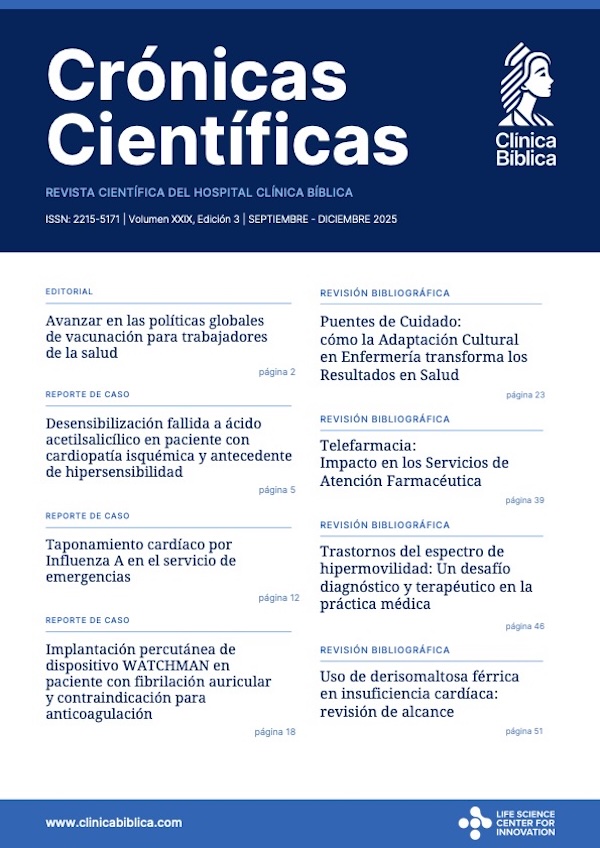- Visto: 1362
Revisión Bibliográfica
Inteligencia artificial: ¿futuro en la psicología?
Volumen XXIX, Edición 2, Mayo - Agosto 2025
DOI: https://doi.org/10.55139/NYGF6130
APA (7ª edición)
Rojas-Chacón, L. (2025). Inteligencia artificial: ¿futuro en la psicología? Crónicas Científicas. Revista Científica del Hospital Clínica Bíblica, 29(2), 24–30. https://doi.org/10.55139/NYGF6130.
Vancouver
Rojas-Chacón L. Inteligencia artificial: ¿futuro en la psicología? Crónicas Científicas Rev Cient Hosp Clín Bíblica. 2025;29(2):24-30. doi:10.55139/NYGF6130.
Laura Rojas Chacón
Enfermera Sala de Infusiones, Clínica Bíblica, estudiante último año de Licenciatura Psicología Universidad Hispanoamericana, San José, Costa Rica.
Resumen
La inteligencia artificial se encarga de crear programas informáticos que realizan o ejecutan órdenes de manera similar al cerebro humano. Esta tecnología tiene la capacidad de pronosticar trastornos utilizando datos personales y formulando patrones de comportamiento digital para anticipar alguna patología o crisis, por lo que su pronóstico diagnóstico se torna relevante en este campo. Se realizó una revisión bibliográfica de literatura actual sobre el tema en mención. En la psicoterapia, la IA (inteligencia artificial) tiene la capacidad de proporcionar tratamientos personalizados, esclarece por qué ciertas terapias no son funcionales para determinada persona, o cómo se puede llegar a la modificación conductual deseada. Dentro de las limitaciones en su uso, se observa que, a pesar de tener una capacidad para simular interacciones humanas, no simula empatía verdadera, habilidad indispensable a la hora de aplicar la psicología. Esta tecnología no tiene capacidad para interpretar la ironía o el sarcasmo de un paciente, lo que puede hacerla incurrir en un error, y facilitar sugerencias terapéuticas inapropiadas y riesgosas. Estos potenciales errores tienen implicancia ética que se deben tomar en cuenta a la hora de incorporar esta tecnología a las prácticas clínicas, y tratar con personas. Asimismo, dentro de estas consideraciones éticas, se mencionan temas como confidencialidad, resguardo y seguridad de datos, principios de autonomía, justicia, no maleficencia, beneficencia y consentimiento informado. Por lo tanto, a la hora de hablar de IA se debe de tomar en cuenta las limitantes que involucra su aplicación en lo que respecta a la psicología.
Palabras claves
Inteligencia artificial generativa, psicoterapia, diagnóstico clínico, psicología clínica, inteligencia.
Abstract
Artificial intelligence oversees creating computer programs that perform or execute commands like the human brain. This technology could predict disorders using personal data and formulate digital behavior patterns to anticipate a pathology or crisis, making its diagnostic prognosis relevant in this field. A bibliographic review of current literature on the subject in question was carried out. In psychotherapy, AI can provide personalized treatments, clarifying why certain therapies don't work for a particular person, or how to achieve the desired behavioral modification. Among its limitations is that, despite its ability to simulate human interactions, it lacks empathy, an essential skill when applying psychology. This technology lacks the ability to interpret a patient's irony or sarcasm, which can lead to errors and facilitate inappropriate and risky therapeutic suggestions. The use of AI in psychology entails a series of ethical implications that must be addressed when incorporating this technology into clinical practice. These include issues such as confidentiality, data protection and security, principles of autonomy, justice, nonmaleficence, beneficence, and informed consent. Therefore, when discussing AI, one must consider the limitations of its application in terms of psychology.
Keywords
Generative Artificial Intelligence, psychotherapy, clinical diagnosis, psychology, clinical, intelligence.
Referencias
1. Montalván Vélez CL, Mogrovejo-Zambrano JN, Romero-Vitte IJ, Pinargote Carrera MLDC. Introducción a la Inteligencia Artificial: Conceptos Básicos y Aplicaciones Cotidianas. Journal of Economic and Social Science Research. 2024 Jan 31;4(1):173–83. https://doi.org/10.55813/gaea/jessr/v4/n1/93
2. Granados Ferreira, J. Análisis de la inteligencia artificial en las relaciones laborales. Rev. CES derecho. 2022; 13(1). https://doi.org/10.21615/cesder.6395
3. Schwab Klaus.La-Cuarta-Revolución-Industrial.-Futuro-Hoy. Fondo Editorial de la sociedad secular humanista del Perú. 2020 Dec;1:6–10.
4. Gómez D, Álvarez Sobrado N. Psicología e inteligencia artificial una relación dialéctica en constante evolución. 2023;38–43. Disponible en https://www.aacademica.org/000-009/914
5. Zerón A. Inteligencia artificial y charlas robotizadas por ChatGPT. Revista de la Asociación Dental Mexicana. 2023;80(2):66–9. doi: 10.35366/110644
6. Korteling J EH, van de Boer-Visschedijk GC, Blankendaal RAM, Boonekamp RC and Eikelboom AR Human versus Artificial Intelligence. (2021) Front. Artif. Intell. 4:622364. doi: 10.3389/- frai.2021.622364
7. Guaña Moya J, Chipuxi-Fajardo L. Impacto de la inteligencia artificial en la ética y la privacidad de los datos Impact of artificial intelligence on ethics and data privacy Impacto da inteligência artificial na ética e na privacidade dos dados Quito, Ecuador. RECIAMUC. 2023;7(1):923-930. Disponible en: https://reciamuc.com/index.php/RECIAMUC/article/view/1135
8. Shiffrin R, Mitchell M. Probing the psychology of AI models., Proceedings of the National Academy of Sciences of the United States of America. National Academy of Sciences. 2023;120:1–3. https://doi.org/10.1073/pnas.2300963120
9. Alqahtani T, Badreldin HA, Alrashed M, Alshaya AI, Alghamdi SS, bin Saleh K, et al. The emergent role of artificial intelligen- ce, natural learning processing, and large language models in higher education and research. Research in Social and Administrative Pharmacy. 2023;19:1236–42. https://doi.org/10.1016/j.sapharm.2023.05.016
10. Raraz-Vidal J. La Importancia de las Bases de Datos para el Entrenamiento en Inteligencia Artificial. Revista Peruana de Investigación en Salud. 2023 Sep 30;7(3):121–2. https://doi.org/10.35839/repis.7.3.1970
11. Olawade DB, Wada OZ, Odetayo A, David-Olawade AC, Asaolu F, Eberhardt J. Enhancing mental health with Artificial Intelligence: Current trends and future prospects. Journal of Medicine, Surgery, and Public Health. 2024 Aug; 3:100099. https://doi.org/10.1016/j.glmedi.2024.100099
12. Abbas Noorhan, Whitfield Jenni, Atwell Eric, Bowman Helen, Pickard Thomas, Walker Aisha. Online chat and chatbots to enhance mature student engagement in higher education. 2022.:308-326. https://doi.org/10.1080/02601370.2022.2066213
13. Beg MJ, Verma M, M VCKM, Verma MK. Artificial Intelligence for Psychotherapy: A Review of the Current State and Future Directions. Indian Journal of Psychological Medicine. 2024. DOI 10.1177/02537176241260819
14. Grote T, Berens P. Uncertainty, Evidence, and the Integration of Machine Learning into Medical Practice. Journal of Medicine and Philosophy (United Kingdom). 2023 Feb 1;48(1):84–97. https://doi.org/10.1093/jmp/jhac034
15. Ávila Tomás JF, Mayer-Pujadas MA, Quesada-Varela VJ. Artificial intelligence and its applications in medicine II: Current importance and practical applications. Aten Primaria. 2021 Jan 1;53(1):81–8. https://doi.org/10.1016/j.aprim.2020.04.014
16. Salazar Garcés LF, Velastegui Hernandez DC. Inteligencia Artificial y su Impacto en la Psicología Humana: Mini Revisión. Mediciencias UTA. 2024 Jan 1;8(1):26–34. https://doi.org/10.31243/mdc.uta.v8i1.2306.2024
17. Lanzagorta Ortega D, Carrillo-Pérez DL, Carrillo-Esper R. Artificial intelligence in medicine: present and future. Gac Med Mex. 2022 Dec 1;158:55–9. Doi: 10.24875/GMM.M22000688.
18. Ibarra Pincay Melanie, Alcívar Cevallos Roberth. IA psicología. ingeniar. 2023 Jan 10;7:80–1. Disponible en: https://journalingeniar.org/index.php/ingeniar/article/view/162
19. Álvarez Vega M, Quirós Mora LM, Cortés Badilla MV. Inteligen- cia artificial y aprendizaje automático en medicina. Revista Médica Sinergia. 2020 Aug 1;5(8):e557. https://doi.org/10.31434/rms.v5i8.557
20. Zhong W, Luo J, Zhang H. The therapeutic effectiveness of artificial intelligence-based chatbots in alleviation of depressi- ve and anxiety symptoms in short-course treatments: A systematic review and meta-analysis. Journal of Affective Disorders. 2024;356:459–69. https://doi.org/10.1016/j.jad.2024.04.057
21. Sadeghi Z, Alizadehsani R, CIFCI MA, Kausar S, Rehman R, Mahanta P, et al. A review of Explainable Artificial Intelligence in healthcare. Computers and Electrical Engineering. 2024 Aug 1;118. https://doi.org/10.1016/j.compeleceng.2024.109370
22. Salazar Garcés LF, Velastegui Hernandez DC. Inteligencia Artificial y su Impacto en la Psicología Humana: Mini Revisión. Mediciencias UTA. 2024 Jan 1;8(1):26–34. https://doi.org/10.31243/mdc.uta.v8i1.2306.2024
23. Diago Alfes III Z, Leonor Galarza Chicaiza GI, José Terán MI. El papel de la inteligencia artificial en la promoción de la salud mental y el bienestar: una revisión sistemática. Polo de conoci- miento [Internet]. 2024 Dec 26;101:2550–682. doi: 10.23857/pc.v9i11.859
24. Medinaceli Díaz KI, Martin M, Choque S. Impacto y regulación de la Inteligencia Artificial en el ámbito sanitario* Artificial Intelligence impact and regulation in the healthcare field. 2020 Oct 28;15(48). https://doi.org/10.35487/rius.v15i48.2021.745
25. Carlbring P, Hadjistavropoulos H, Kleiboer A, Andersson G. A new era in Internet interventions: The advent of Chat-GPT and AI-assisted therapist guidance. Internet Interventions. 2023;32. https://doi.org/10.1016/j.invent.2023.100621
26. Zhao J, Wu M, Zhou L, Wang X, Jia J. Cognitive psycholo- gy-based artificial intelligence review. Frontiers in Neuroscien- ce. 2022;16:1024316. https://doi.org/10.3389/fnins.2022.1024316
APA (7ª edición)
Rojas-Chacón, L. (2025). Inteligencia artificial: ¿futuro en la psicología? Crónicas Científicas. Revista Científica del Hospital Clínica Bíblica, 29(2), 24–30. https://doi.org/10.55139/NYGF6130.
Vancouver
Rojas-Chacón L. Inteligencia artificial: ¿futuro en la psicología? Crónicas Científicas Rev Cient Hosp Clín Bíblica. 2025;29(2):24-30. doi:10.55139/NYGF6130.
Esta obra está bajo una licencia internacional Creative Commons: Atribución-NoComercial-CompartirIgual 4.0 Internacional (CC BY-NC-SA 4.0)

Realizar búsqueda
Última Edición
Ediciones Anteriores






